Abstracts - York St John University
Abstracts - York St John University
Abstracts - York St John University
Create successful ePaper yourself
Turn your PDF publications into a flip-book with our unique Google optimized e-Paper software.
nightclubs and dance classes, were centred on the subject of contemporary re-‐enactments<br />
of orientalism and mythologies around ‘Oriental woman’ as one of ‘the Other of Europe’.<br />
Belly dancers, or oriental dancers who I interviewed in these different locations are<br />
‘nomadic subjects’, whose identities are multiple, imagined, and performed, featuring<br />
elements of orientalist fantasy, and often incorporating potentially empowering symbols of<br />
Mother Goddess. They are subaltern subjects who find ways to speak through their dance,<br />
online domains and their women-‐dominated belly dance subcultures. Romantic<br />
connotations with ‘all things Gypsy’, nomadism and travel are abundant in contemporary<br />
belly dancing troupes and identities. But the ‘Gypsy-‐belly dance’ spectacle of mystery,<br />
exoticism, freedom and abandon by transgressive outsiders clashes with the harsh<br />
experiences of European and Turkish Romani peoples, as well as many other migrant<br />
groups.<br />
By presenting a case of a Turkish Romany performer from Istanbul, I will focus on the<br />
responsibilities of (eastern and western) performers in becoming the ‘Other’ in a<br />
contemporary globalised world. I will explore the complexities of belly dance as a trans-‐<br />
national globalised dance practice that has been highly altered by digital media. My paper<br />
will also explore the potentials of my nomadic political performance practice and dynamic<br />
alliances between dancers and performers of different and multiple backgrounds.<br />
Edina Husanovic was born in Bosnia where they know something about having fun with<br />
absurd situations. She is a multi-‐media performance artist resident in Brighton and<br />
studying for PhD in theatre at the <strong>University</strong> of Reading. She is also known as Lily Lazuli in<br />
the weird and wonderful world of belly dance, and has been called ‘a political belly dancer’<br />
as in her performances she prayed to the temple of Angelina Jolie, hand-‐stretched an Axl<br />
Rose filo pastry pie, and belly danced as David Cameron. Little wonder that reviewers were<br />
left ‘bewildered’, and saying: “Orientalists will be disoriented and Disorientalists<br />
reoriented. Her mystical eyes are full of irony so beware!”<br />
Re-imagining Social Space through an openness to the Becoming of Place<br />
<strong>St</strong>eve Fossey (Middlesex <strong>University</strong>)<br />
One of the challenges that makers of site specific performance face is how to qualify and<br />
articulate site specificity, in era where prevalent discourses and practices argue less for<br />
substantive and fixed understandings of location, and more for fluid and mulitiplicitous<br />
senses of place. As a maker of site specific performance I find myself embracing the idea<br />
that our senses of place, and in turn our identities that are affected by the spaces we<br />
encounter, are in constant states of becoming. This acknowledgment liberates our<br />
imaginings of place from the hegemonic clutches of received tacit agreements, and opens<br />
them up to creative spatial possibilities.<br />
Rather than accept the negativity of Marc Augé’s observation that we spend more of our<br />
time in non-‐places and states of transit, I am interested in exploring the positive potential of<br />
a closer inspection of the specifics of these fluid states, positioning site itself as the<br />
transitory process, which is in turn productive of culture and identity. I would argue that by<br />
composing situations that combine performative approaches to dialoguing experience, with<br />
everyday modes and technologies of communication, a re-‐imagining of social space can<br />
occur.<br />
In For Space Doreen Massey argues ‘not just for a notion of becoming’ but instead ‘for the<br />
openness of that process of becoming’ (Massey 2005: p21). This paper will discuss the<br />
9


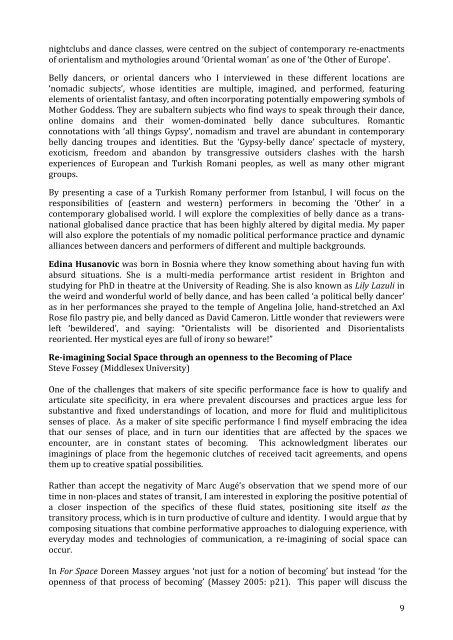
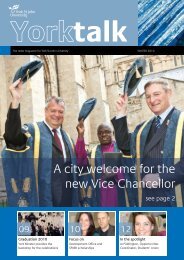

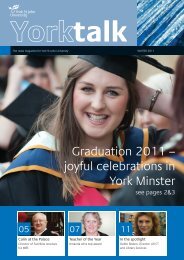
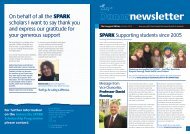

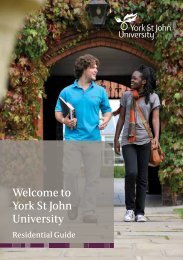

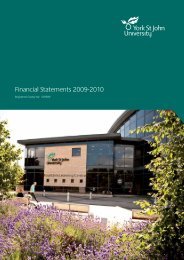

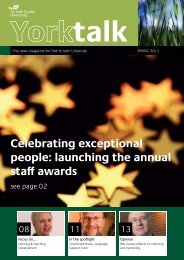


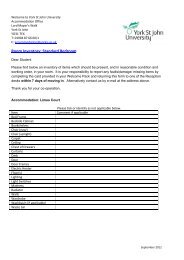

![â'Those [women] who feel strong and hope to find employment, a ...](https://img.yumpu.com/53506972/1/184x260/athose-women-who-feel-strong-and-hope-to-find-employment-a-.jpg?quality=85)